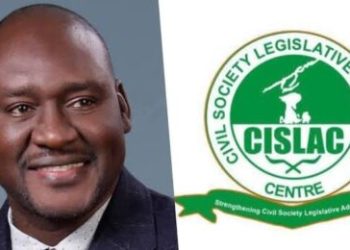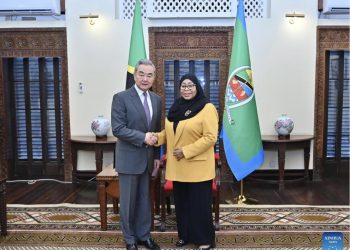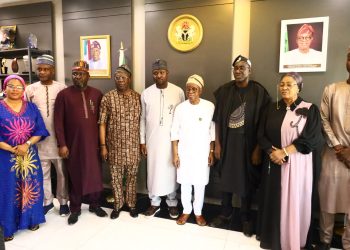By Eze Nkechi
As part of repositioning and bolstering the brand reputation of Nigeria, the Federal Government has unveiled the Nigeria Reputation Management Group (NRMG) in Abuja.
The unveiling which took place on Tuesday in Abuja was attended by the Minister of Foreign Affairs, Yusuf Maitama Tuggar, Minister of Information, Mohammed Idris, former and current leaders and fellows of the institute.
The Minister of Foreign Affairs in his opening remarks said perception – whether positive or negative – has profound implications not only for Nigeria’s political standing, but also for economic growth and social cohesion.
Speaking further, the minister pointed out that “we live in an era where information travels at unprecedented speed” such that a “single event, a careless statement, or even a misleading news story can go viral within minutes, spreading across borders and continents.”
Further explaining that even when borders were closed at the height of the COVID-19 pandemic and people, goods and services stopped moving, information and ideas continued to traverse the planet.
The Black Lives Matter movement, he said, ignited across oceans in spite of this physical linkage and that Nigeria had its variety in the form of END-SARS.
“False narratives and misinformation have the power to distort facts, shift public opinion, and damage reputations in ways that are difficult to reverse. In a world where anyone with a smartphone can become a content creator, where social media algorithms prioritize engagement over accuracy, and where the 24-hour news cycle thrives on sensationalism, it’s “critical to address and counter these threats to our national reputation.” He said.
He decried that “we continue to deal with fake news attacks from outside seeking to divide our country. Quite often emotions are taken as evidence of being right.”
The minister said the role of social media in shaping perceptions of nations cannot be overstated. Platforms like Twitter, Facebook, Instagram, and TikTok, he said, have given ordinary citizens the power to create, share, and consume information at a stunning pace.
While this democratisation of information has many benefits, he emphasised that it also comes with significant challenges, particularly when it comes to national reputation management.
He informed that the 24-hour news cycle has also fundamentally altered the landscape of international diplomacy.
According to him, there was time for reflection and strategic communication, today’s fast-paced media environment rewards immediacy.
Unfortunately, this means that stories about Nigeria are often framed through negative stereotypes, reinforcing old perceptions and creating new negative ones that are difficult to disabuse, the minister frowned.
Uniquely, he said, this presents a particular challenge for Nigeria because as Africa’s most populous country and largest economy, Nigeria is often in the global spotlight.
“Our actions, our successes, and our challenges are scrutinised at every turn. Yet, we know that perception often lags behind reality.
“While Nigeria has made significant strides in areas such as technology, culture, and entrepreneurship, these achievements are not always given the same visibility as stories about corruption, insecurity, or political instability,” he said.
To address these challenges, he said Nigeria must embrace a proactive approach to reputation management.
This, according to Tuggar, begins with effective communication. “We must tell our own story before others tell it for us, and we must ensure that the story we tell is both honest and aspirational.
“National reputation is not about glossing over challenges or ignoring problems, but about framing those challenges within a broader narrative of progress, resilience and potential.
“Importantly, our citizens have a key role to play. The image of any nation is not shaped solely by its leaders, diplomats, or businesses, but also by the actions, attitudes, and behaviours of its citizens.
“Nigerians, both at home and in the diaspora, are the primary ambassadors of our national brand. Every interaction, every social media post, and every business transaction contributes to how Nigeria is perceived globally.
“It is, therefore, essential that the government, the private sector, civil society and broader citizenry work together to foster a sense of pride and responsibility among all Nigerians. This approach is a key aspect of the Diaspora pillar of the Tinubu Doctrine of 4-D Diplomacy,” the Minister said.
He emphasised the need to create an environment where citizens feel empowered to contribute positively to the national image. This can be achieved by ensuring that the government listens to, and acts upon, the needs and desires of its people,” he said.
He argued that when the Nigerians feel heard, valued, and supported, they are more likely to engage constructively and to contribute to a positive national image.
This, he said, is why it is vital that “we continue to pursue reforms that promote good governance, transparency, and accountability.
“A government that is responsive to the needs of its people will inevitably enjoy a better reputation, both domestically and internationally.”
To address domestic concerns, he said Nigeria must also actively promote its national interests on the global stage. “We must take advantage of platforms such as ECOWAS, the African Union, the United Nations, and the Commonwealth to advocate for policies that align with our values and priorities.”
Earlier, in his opening remarks, the NIPR president, Ike Neliaku, said NRMG “will become Nigeria’s biggest possible Transformation Pillar and Driver – The Reputation Project.”
He stated that “reputation is a core asset of inestimable value, be it to a nation, an organisation or even an individual.”
He emphasised that as important as reputation is, it is not easily attained. It comes with a lot of hard work, careful design, deep foresight, skillful planning, and strategic implementation of well orchestrated programmes and actions, Neliaku said.
He explained that “reputation takes a long journey, most times it is like a relay race, highly delicate and easily perishable.
“While it takes a long time to build, it takes a short time to be damaged.” Stressed that the “reputation of Nigeria needs some help. The reputation and image of Nigeria needs conscious, deliberate attention.”
The NIPR president said, “like a living thing, reputation is birthed; reputation needs air to survive; reputation is nurtured with the right character. When reputation is created and built as an asset, it is consciously managed and effectively sustained.
He said while “recognising our challenges in some areas, we cannot deny that Nigeria has good components of these elements to create a reputation renaissance, at this time.
“This is why we formally unveiled a professional, private sector led platform, that will partner with relevant agencies of government and the private sector, to harvest, harness, recreate and manage our reputation capital as one of the biggest and most valued assets of Nigeria.”
He emphasised that the NRMG platform is designed to be very inclusive.














